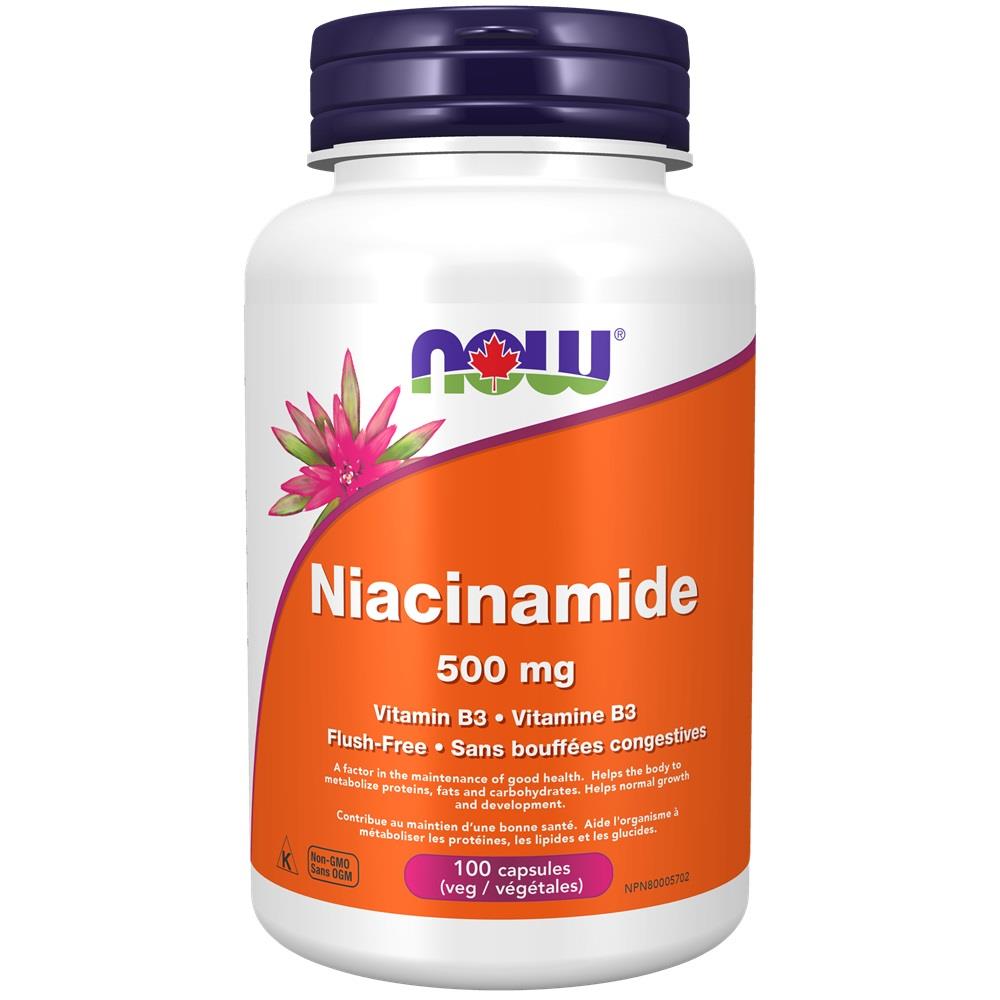NOW Niacinamide 500mg 100caps NOW
$ 14,50 $ 8,70
NOW Niacinamide
Helps the body to metabolize carbohydrates, fats and protein. Helps normal growth and development. The use of niacinamide as a source of vitamin B-3 is often preferred over niacin because it does not produce flushing of the skin, which is the most common side effect of niacin use. Niacinamide also appears to have no effect on insulin secretion or glucose kinetics, unlike niacin, which can increase insulin resistance.
Vitamin B-3 is an essential nutrient. Vitamin B-3 comes in the form of niacin (nicotinic acid) or its amide, niacinamide. The human body can make niacinamide from tryptophan, an amino acid found in protein-containing foods such as red meat, poultry, eggs, and dairy products, but this accounts for only a fraction of the body’s requirements. Niacin can also be converted to niacinamide in the body. Vitamin B-3 is involved in a range of metabolic processes and is a coenzyme in several important biochemical functions. Niacinamide is a component of the coenzymes called nicotinamide adenine dinucleotide phosphate (NADP) and nicotinamide adenine dinucleotide (NAD). It combines with them to convert glycogen into glucose and to release energy from body tissues.
Directions:
Adult Dosage: Take 1 capsule daily with meals.
Ingredients (each capsule contains):
Vitamin B-3 (as Niacinamide)……………………………………500 mg
Non-Medicinal Ingredients:
Capsule (gelatin, water), Magnesium Stearate.
Fast Shipping with Professional Packaging
Due to our longstanding partnership with UPS FedEx DHL as well as other top international carriers, we are able to offer a variety shipping options. Our warehouse staff are trained to pack your goods precisely according to the specifications we offer. Your items are carefully inspected and secured properly prior to shipping. Everyday, we send to thousands of customers in many countries. The fact that we are committed to becoming the biggest online retailer in the world is obvious. Both Europe and the USA have warehouses and distribution centers.
Note: Orders with more than one item are assigned a processing period in accordance with the item.
Before shipment, all ordered items will be thoroughly examined. The majority of orders will be sent within 48 hours. The delivery time is between 3-7 days.
Returns
Due to multiple parties which include the factory as well as the warehouse, we cannot fully manage stock. The actual levels of stock can change at any point. It's possible that you may not receive your order after it's been placed.
Our policy lasts thirty days. If it's been more 30 days since you made your purchase We're sorry to say that we can't offer you a complete exchange or refund.
The item must not be used and in its original condition. The item must be in its original packaging.
Related products
VEG OMEGA 3
GRMNEMA-75
MENOPAUSE FORMULA
BIO STRATH
DEEP SLEEP
THYROID SUPPORT
SABALASAN PROSTATE 1
BACOPA ENLIGHTEN
MENOPAUSE
CITICOLINE
ECHINAFORCE
ECHINAFOCE FORTE
ST. JOHN'S WORT OIL
ANTIOXIDANT SYNERGY
MILK THISTLE
SORE THROAT SPRAY
CYSTOFORCE
SHARP VISION CLAIRE
SABALASAN PROSTATE 1
ECHINAFORCE EXTRA 1200MG
CURCUMIN-95
GASTRO RELIEF
VENAFORCE GEL
ACTIVE GREEN TEA
CARDANA CAPS
C+BIOFLAVONOIDS
INOSITOL POWDER
ECHINAFORCE

































